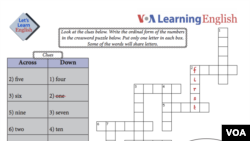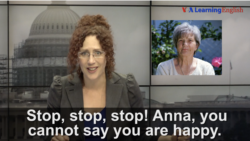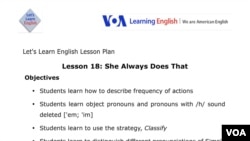Lesson 18: She Always Does That
Let’s Learn English เปิดโอกาสการเรียนรู้และฝึกทักษะภาษาอังกฤษ ในรูปแบบที่ถูกออกแบบโดยผู้เชี่ยวชาญตามมาตรฐานการศึกษาของอเมริกา เพื่อให้เนื้อหาเหมาะสำหรับผู้เริ่มเรียนภาษาอังกฤษ
เรานำเสนอ 52 บทเรียน และทุกๆ 5 บทเรียน จะมีการทบทวนสิ่งที่เรียนไปแล้ว
ทุกสัปดาห์จะมีบทเรียนใหม่ พร้อมด้วยวิดีโอ ที่สะท้อนชีวิตชาวอเมริกันรุ่นใหม่ ผู้เรียนจะได้ฝึกการพูด เขียน และจดจำคำศัพท์
นอกจากนั้นผู้เรียนสามารถพิมพ์บทเรียนที่ทำแล้ว ผลการฝึกฝน และแผนการฝึกเรียนภาษาอังกฤษในบทต่อๆ ไปได้
เราอยากให้คุณติดตามบทเรียนใหม่ๆ ทุกสัปดาห์ และบอกให้เรารู้ถึงการเรียนรู้ของคุณผ่านการแสดงความคิดเห็น (comment) และอีเมล์ของเราที่ thai@voanews.com
เรื่องย่อ
แอนนาได้มีโอกาสมาอ่านข่าวเป็นครั้งแรก และเธอได้รู้ว่าวิธีใดเป็นการอ่านข่าวที่ถูกต้องและไม่ถูกต้อง
ฝึกพูด
ในคลิปวิดีโอนี้ คุณจะได้เรียนรู้คำศัพท์ใหม่ๆ นอกจากนี้ จะได้รู้จักการใช้วลี "got it" เพื่อสื่อถึงความเข้าใจด้วย
ฝึกออกเสียง
ในคลิปวิดิโอนี้ จะมีการสอนรูปแบบของการออกเสียงคำที่ขึ้นต้นด้วย th และ h และจะสอนการออกเสียง s ในการลงท้าย เช่น talks และ says
บทสนทนา
Anna: Hello, from Washington, D.C.! Today at work I am reading the news for the first time. I am really nervous. But my boss, Ms. Weaver, is here to help me.
Caty: Now, Anna, remember. When we read the news we are always reading facts. We never show our feelings.
Anna: Sure thing, Ms. Weaver.
Caty: Great. Are you ready?
Anna: Yes.
Caty: Okay, let’s try the first story!
Anna: Hello, and welcome to The News.
Anna: A new book is very popular with children and families. This is it.
Anna: It is about a lost duckling. The duck's mother cannot find him.
Caty: Stop! Anna, when you say the words “duck” and “duckling” you look really sad.
Anna: I do?
Caty: Yes. Sad is a feeling.
Anna: Sad is not a fact. Sorry. Let me try again.
Caty: Okay, she’s trying again! And go.
Anna: Hello, and welcome to The News. A new book is very popular with children and families. This is it.
Anna: It is about a lost duckling. The duck’s mother can not find ‘im. But a family gives him a home.
Caty: Stop! Anna, you are doing it again.
Anna: This story is very sad.
Caty: I have an idea. Let’s read the second story. She’s reading the second story. And … go!
Anna: Hello , and welcome to The News. In Indiana, a grandmother is the first 80-year-old woman to win The Race Car 500.
Anna: That is awesome!
Caty: Stop! Stop! Anna, please -- no feelings.
Anna: Right. But it is awesome that an 80-year-old grandmother wins a car race.
Caty: Just the facts, Anna.
Anna: Right.
Anna: Hello, and welcome to The News. In Indiana, a grandmother is the first 80-year-old woman to win The Race Car 500.
Anna: She rarely talks to reporters. But when she does, she often says, “Nothing can stop me now!”
Anna: I am very happy for her!
Caty: Stop, stop, stop!! Anna, you cannot say you are happy.
Anna: But I am happy.
Caty: But you can’t say it.
Anna: Why?
Caty: This is the News. Happy and sad are feelings. You can’t have them in The News.
Anna: Okay. I got it.
Caty: Okay. Let’s try the third story. She’s reading the third story!
Anna: Hello and welcome to The News.
City politicians in Big Town are using city money to have a big party on a cruise ship. They are taking the money for the party from the children’s library.
Anna: What?! That makes me very angry.
Caty: No, no, no! Anna, you cannot say you are angry! This is The News!!!
Anna: What can I do, Ms. Weaver? Take out my feelings and put them here … on the news desk?
Caty: Yes. Yes. That’s right! Now you’ve got it!
Caty: Let’s repeat the first story.
Anna: This is going to be a very long day.
Anna: Until next time!
ฝึกเขียน
ในบทเรียนนี้ แอนนารู้สึกประหม่าที่จะได้อ่านข่าวเป็นครั้งแรก และคุณรู้สึกอย่างไรเมื่อได้ลองทำอะไรเป็นครั้งแรกบ้าง? เขียนมาเล่าให้ฟังเกี่ยวกับประสบการณ์ครั้งแรกของคุณที่โรงเรียนหรือที่ทำงาน โดยสามารถ อีเมลหาเรา หรือเขียนที่ช่องแสดงความเห็น (Comment) ด้านล่าง
คลิกที่ เอกสารประกอบการเรียน เพื่อฝึกเขียนและฝึกการใช้ตัวเลขแสดงลำดับด้วย
กลยุทธ์การเรียนรู้แบบลัด
Learning Strategies หรือ กลยุทธ์การเรียนรู้ คือความคิด ความตั้งใจ และการกระทำ ที่ช่วยให้การเรียนง่ายขึ้น หรือมีประสิทธิภาพมากขึ้น
กลยุทธ์การเรียนรู้ของตอนนี้ คือ การจัดกลุ่ม หรือจำแนกประเภท (Classify) เราจะสามารถจำแนกประเภทคำศัพท์ที่ได้เรียนรู้มา หรือจัดกลุ่มคำเหล่านั้นเพื่อช่วยในการจดจำ
ในบทเรียนนี้ คุณจะพบว่าแคที จัดรูปแบบการอ่านข่าวให้กับแอนนา โดยบอกว่า "เมื่อเราอ่านข่าว เราจะต้องอ่านตามความจริงเสมอ และห้ามแสดงอารมณ์หรือความรู้สึกลงไปในข่าว" การจำแนกรูปแบบที่แตกต่างกับระหว่าง ความจริง กับความรู้สึก จึงเป็นโจทย์ใหญ่ที่แอนนาจะต้องเรียนรู้ในการอ่านข่าวตามแบบที่แคทีต้องการได้
และคุณได้ใช้หลักการจัดกลุ่ม หรือจำแนกประเภท (Classify) ในการเรียนภาษาอังกฤษอย่างไรบ้าง? เขียนหาเราที่ช่องแสดงความเห็นด้านล่าง หรือ อีเมลหาเรา
ครูผู้สอน คลิกที่ Lesson Plan เพื่อดูกลยุทธ์การสอนในบทเรียนนี้
แบบทดสอบการฟัง
ทดสอบความเข้าใจในบทเรียนนี้ด้วยแบบทดสอบการฟัง คลิกที่วิดีโอนี้ และเลือกคำตอบที่ดีที่สุด
Quiz - Lesson 18: She Always Does That
Start the Quiz to find out
______________________________________________________________
คำศัพท์ใหม่
angry – adj. having a strong feeling of being upset or annoyed
cruise ship – n. a large ship that stops at different ports and carries passengers who are traveling for pleasure
desk – n. a piece of furniture that is like a table and often has drawers
duck – n. a bird that swims and has a flat beak, a short neck, a heavy body, short legs, and webbed feet
duckling – n. a young duck
fact – n. a true piece of information
feeling – n. an emotional state or reaction
get – v. to understand (something or someone)
Indiana – n. state of the U.S.
long – adj. lasting or continuing for a great amount of time
lost – adj. not knowing where you are or how to get to where you want to go
popular – adj. liked or enjoyed by many people
race car – n. a very fast car that is used in professional auto racing
rarely – adv. not very often
repeat – v. to say (something) again
sad – adj. not happy
story – n. a description of how something happened
throw – v. to cause (something) to move out of your hand and through the air by quickly moving your arm forward
win – v. to achieve victory in a fight, contest, game, etc.
______________________________________________________________
เอกสารประกอบการเรียน
ดาวน์โหลด VOA Learning English Word Book ซึ่งเป็นเอกสารรวมคำศัพท์ที่ใช้ในเว็บไซต์นี้
ในแต่ละบทเรียนของ Let’s Learn English เรามีชุดฝึกทบทวน Activity Sheet สำหรับการฝึกเพิ่มเติมที่คุณทำได้เอง
สำหรับครูผู้สอน
คลิกที่ Lesson Plan ในบทเรียนนี้ เพื่อเป็นแนวทางในการเรียนการสอนในห้องเรียนของคุณ หรือ อีเมลหาเรา หากมีคำถามหรือคำแนะนำในหลักสูตรนี้
ไวยากรณ์ที่ควรใส่ใจ
การอธิบายคำศัพท์ว่าด้วยความถี่ คำสรรพนาม และตัวเลขแสดงลำดับ
หัวข้อหลักในบทนี้
การแสดงความรู้สึกต่อข้อมูล ระหว่าง ความจริง กับ ความรู้สึก
กลยุทธ์การเรียนรู้แบบลัด
การจัดกลุ่ม หรือจำแนกประเภท (Classify)
การฝึกพูดและการออกเสียงที่ควรใส่ใจ
คำสรรพนามที่ไม่ออกเสียง h ในคำเหล่านั้น
______________________________________________________________
ตอนนี้คุณสามารถบอกเราได้ว่าคุณคิดอย่างไรกับบทเรียนนี้ ด้วยการเขียนอีเมลหาเรา หรือแสดงความคิดเห็นมาที่ช่องแสดงความคิดเห็นด้านล่าง หรือส่งมาทางหน้า Facebook




